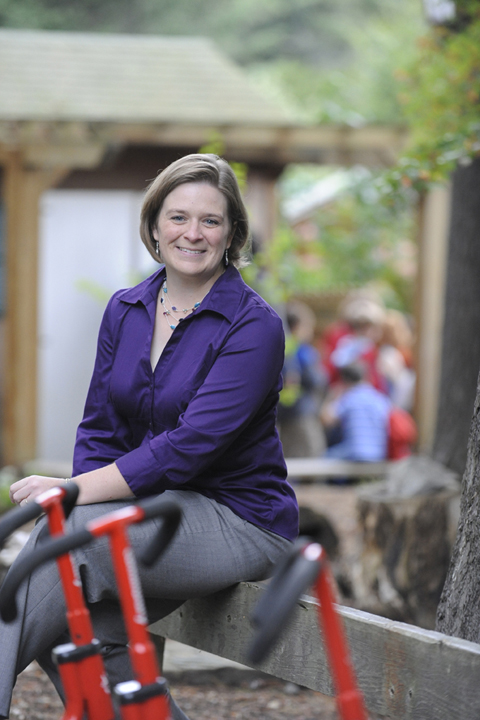Wellesley's Markella Rutherford Focuses on Freedom and Boundaries
in Popular Parenting Advice
FOR IMMEDIATE RELEASE:
Nov. 18, 2009 |
|
WELLESLEY,
Mass.— Should parents give their children more chores? Is it okay to let them dress how they want? Is constant adult supervision a must?
 |
Wellesley's Markella Rutherford focuses on the nature of advice-giving and how Americans understand personal autonomy as a cultural value.
Photo by Richard Howard
|
Markella “Kelly” Rutherford, assistant professor of sociology at Wellesley College, evaluated how parenting advice on these questions has changed over time in her study, “Children's Autonomy and Responsibility: An Analysis of Child Rearing Advice,” recently published in the journal Qualitative Sociology.
Rutherford analyzed 300 articles from Parents magazine for clues into how parental attitudes have changed since the early 20th century – and found some stark reversals in advice and thought.
Popular advice to parents in recent years has become increasingly dominated by a "therapeutic" or psychological view of children's development that emphasizes children's emotional needs and self-awareness, Rutherford has found. While children have gained more freedom to make choices in the home, their freedom outside the home has become limited substantially.
“Children have gained greater autonomy in the form of self-expression and emotional competence,” she said. “However, larger social changes have contributed to children's loss of autonomy in many of the public spaces of their communities, with parents being advised to provide constant adult supervision for their children. I describe this as a historical public-private trade-off in children's autonomy.”
Her forthcoming book, tentatively titled House Rules: Freedom and Boundaries in Popular Parenting Advice, expands upon the article’s findings, including analysis of a wider array of popular parenting advice. She interviewed parents to understand further how they use different forms of advice and how they think about their own independence in making parenting decisions. She also asked her subjects about their children's opportunities for independence and responsibility and about how parenting and childhood have changed.
“Initially, I began this research project primarily interested in whether parenting advice encouraged parents' sense of autonomy over the choices and decisions that they make about child-rearing,” she said. “However, I found that the ways that children's autonomy is depicted in popular advice provided a very useful illustration of the ways that autonomy can be conceived of differently in private and public spaces.”
Rutherford has also become interested in the ways that advice and parents' concerns about children's exposure to various media illustrate some of the gray areas between public and private space.
“Parents sometimes view media as providing ways to extend the boundaries of private, domestic spaces in positive ways,” she said. “For example, through television and the Internet, children can gain valuable exposure to current events or other cultures from the safety and privacy of home. By providing cell phones, parents can also feel more secure about children's safety when they are away from home. However, parents also voice grave concerns about the ways that these same media bring outside, or public, influences into the private space of their homes.”
Rutherford’s research focuses on the nature of advice-giving and addresses how Americans understand personal autonomy as a cultural value. Her dissertation was an analysis of how commencement speakers use the rhetoric of choice in the admonishments and advice they offer to college graduates as they mark a symbolic beginning of adulthood. She has also conducted research on how the natural birth movement has advocated for women's autonomy over birth experiences.
At Wellesley, Rutherford teaches courses on sociological theory, cultural sociology and social inequality. Her articles have appeared in Qualitative Sociology and Sociological Forum, as well as edited volumes. She also maintains an ongoing interest in a local social movement for social and educational inclusion of disabled children in western Ukraine.
Since 1875, Wellesley College has been a leader in providing an excellent liberal arts education for women who will make a difference in the world. Its 500-acre campus near Boston is home to 2,300 undergraduate students from all 50 states and 75 countries.
###
|

